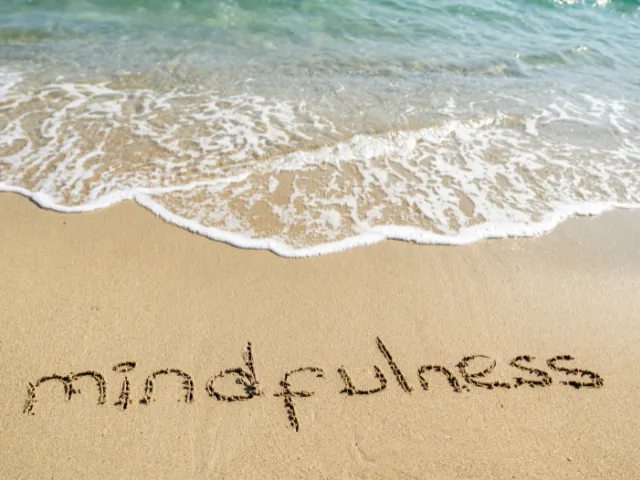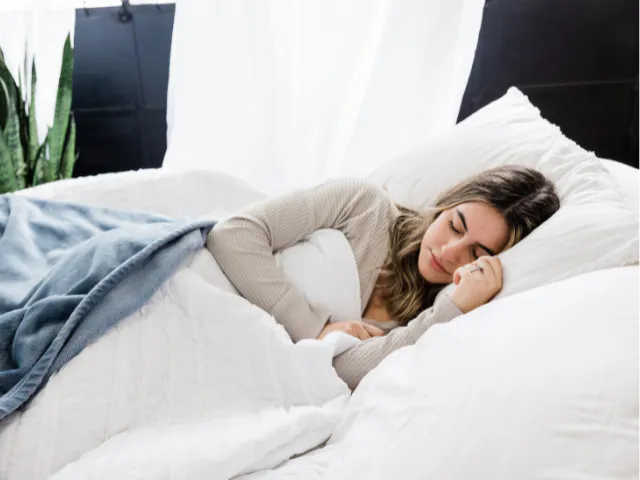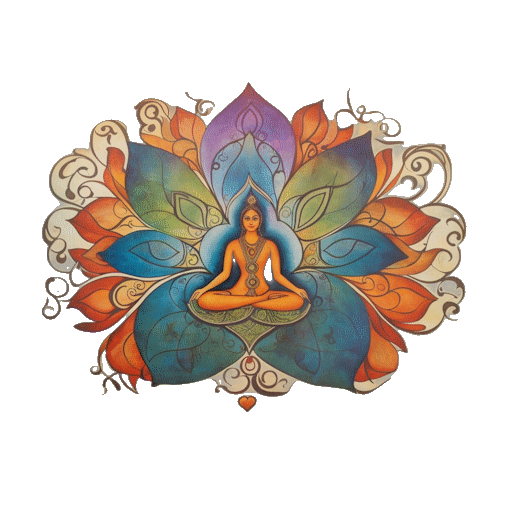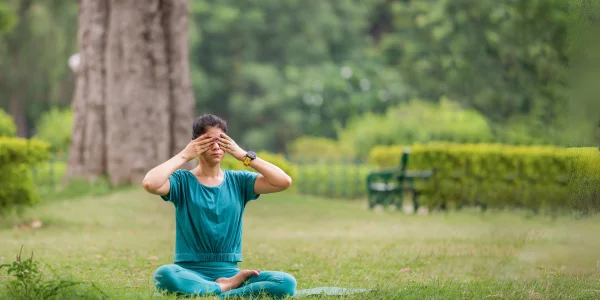Struggling with sleep is a common issue, but it’s not just about the quantity of sleep – it’s about the quality. That’s where the concept of restorative sleep comes into play.
What is Restorative Sleep?
Restorative sleep isn’t just a fancy term for sleeping well. It’s a specific kind of deep sleep that plays a crucial role in refreshing and rejuvenating your body and mind. During restoring sleep, your body isn’t just resting; it’s busy repairing tissues, building bone and muscle, and strengthening your immune system. It’s like a nightly tune-up for your body.
This type of sleep mostly occurs during two stages of sleep: deep sleep and REM (Rapid Eye Movement) sleep. During these stages, your brain waves slow down, and your body gets the chance to focus on healing and growth. Think of it as your body’s way of hitting the reset button, helping you wake up feeling refreshed and ready to tackle the day.
But here’s the catch: not all sleep is restorative. Factors like stress, lifestyle, and even your bedroom environment can impact the quality of your sleep. That’s why understanding how to achieve rejuvenating sleep is so important, especially if you’re one of the many people looking for natural and alternative ways to improve your sleep quality.
In the following sections, we’ll look into some unique and effective methods to help you achieve that deep, healing slumber. From the ancient wisdom of prana to the modern magic of melatonin, we’ve got you covered. So, let’s embark on this journey to better sleep together!
1. Understanding Prana and Sleep

When we talk about restorative sleep, the concept of ‘prana’ or life energy plays a pivotal role. Originating from ancient Indian philosophy, prana is often described as the vital force that permeates all living things. It’s not just about the air we breathe; it’s about the energy that flows through our bodies, influencing our physical, mental, and emotional well-being.
Prana: More Than Just Breath
In the context of sleep, prana is crucial. It’s believed that balanced prana flow contributes to deeper, more healing sleep. When our prana is imbalanced, it can lead to sleep disturbances, restlessness, and even insomnia. This imbalance can be caused by various factors like stress, poor diet, and lack of physical activity.
Balancing Prana for Better Sleep
So, how do we balance this vital energy for quality sleep? Practices like pranayama (breath control exercises), gentle yoga, and meditation are excellent ways to regulate and harmonize prana flow. These practices help calm the mind, reduce stress, and prepare the body for a night of deep, regenerative sleep.
Pranayama: A Gateway to Restful Nights
Pranayama, in particular, is a powerful tool. Simple breathing exercises like ‘Nadi Shodhana’ (alternate nostril breathing) or ‘Bhramari’ (hummingbee breath) can be incredibly effective in calming the nervous system and promoting a state of relaxation. By incorporating these practices into your nightly routine, you can create the ideal conditions for your body to enter healthy sleep.
In essence, understanding and working with prana can be a game-changer in your quest for better sleep. It’s about aligning your life energy to create harmony within, setting the stage for a night of peaceful, rejuvenating sleep.
2. Melatonin Magic and Restorative Sleep

Often referred to as the “sleep hormone,” it is a natural ally in our quest for regenerative sleep. Produced by the pineal gland in the brain, melatonin plays a critical role in regulating our sleep-wake cycle, or circadian rhythm. As night falls, melatonin levels rise, signaling to our body that it’s time to wind down and prepare for sleep.
Understanding its Role in the stages of sleep
Melatonin’s impact on sleep is more nuanced than just making us sleepy. It helps in regulating the timing of when we sleep, ensuring that our sleep is aligned with natural light-dark cycles. This regulation is essential, as it helps in entering and maintaining the deep sleep stages where the most rejuvenation occurs.
Natural Boosters for Melatonin Production
While supplements are widely available, there are natural ways to boost its production. Exposure to natural light during the day, maintaining a regular sleep schedule, and avoiding blue light from screens before bedtime can all help optimize your body’s melatonin levels.
When to Consider Supplements
In some cases, especially where sleep disorders are present, supplements might be beneficial. However, it’s important to approach this option with caution. Supplements can help reset the body’s internal clock, especially for those dealing with jet lag or irregular shift work.
Whether boosted naturally or through supplements, it can be a key component in achieving the restorative sleep you need. By understanding and working with this natural hormone, we can better align our sleep patterns with our body’s innate rhythms, leading to more restful and rejuvenating nights.
Before reaching for supplements, it’s crucial to consult with a healthcare professional. While melatonin is generally considered safe for short-term use, its long-term effects are less clear, and it may interact with various medications or underlying health conditions. A doctor can provide personalized advice based on your specific health needs and sleep issues.
You Might Also Like:
3. The Soothing Power of White Noise

The environment we sleep in plays a pivotal role. One aspect of this environment that’s gaining popularity for its sleep-inducing properties is white noise. White noise is a consistent sound that masks other noises, which might otherwise disrupt sleep. It’s like a blanket of sound that provides a soothing backdrop for sleep.
Why White Noise Works
White noise works by reducing the difference between background sounds and a “peak” sound, like a door slamming or a car honking, which can jolt you awake. This consistent sound helps to create a tranquil environment that can be particularly beneficial for those living in noisy neighborhoods or who are sensitive to sudden sounds during the night.
Choosing the Right White Noise
There’s a variety of white noise options available, from specialized machines to smartphone apps. The key is to find a sound that’s soothing to you. It could be the sound of rain, ocean waves, or even a steady hum. Experiment with different sounds to see which works best for you.
Setting the Volume Right
It’s important to keep the volume at a level that’s soothing and not overwhelming. A gentle, soft background noise is all you need. Too loud, and it might have the opposite effect, disturbing your sleep rather than enhancing it.
White noise isn’t just a modern fad; it’s a practical tool that, when used correctly, can significantly improve the quality of your sleep. By creating a consistent auditory environment, it helps your brain relax and tune out disruptions, making it easier to fall and stay asleep.
4. Yoga Nidra for Deep Relaxation

Yoga Nidra, often referred to as “yogic sleep,” is a powerful relaxation technique and a form of meditation. Unlike physical yoga, which focuses on poses, Nidra is about reaching a state of deep relaxation while remaining fully conscious. This practice has been found to be incredibly effective.
The Process of Yoga Nidra
Yoga Nidra typically involves lying down in a comfortable position and following a guided meditation. The guide leads you through various stages, starting from body awareness, then breath awareness, and gradually moving towards deeper levels of relaxation. The goal is to hover between wakefulness and sleep, where the body finds its natural state of equilibrium – the perfect setup for restorative sleep.
Benefits Beyond Just Sleep
The benefits extend beyond just improving sleep. It’s known to reduce stress and anxiety, which are often significant barriers to restful sleep. Regular practice can help in calming the mind, balancing emotions, and even managing chronic pain – all of which contribute to better rest quality.
Incorporating Yoga Nidra into Your Routine
Incorporating it into your nightly routine can be simple. Many guided sessions are available online, ranging from short 10-minute relaxations to longer, more in-depth practices. The key is consistency; even a few minutes before bed can prepare your mind and body for a night of deep, rejuvenating sleep.
Yoga Nidra is a gentle yet powerful tool in the quest for better sleep. By practicing this ancient technique, you can tap into a deeper level of relaxation, paving the way for a restful and rejuvenating night’s sleep.
5. Aromatherapy Wonders

Aromatherapy, the use of essential oils for therapeutic purposes, has been a go-to for many looking to improve their sleep. Certain scents have the power to calm the mind, relax the body, and create an atmosphere conducive to revitalizing sleep.
Popular Essential Oils for Sleep
Lavender is perhaps the most well-known scent for inducing relaxation and sleep. Studies have shown that lavender oil can decrease heart rate and blood pressure, potentially putting you in a more relaxed state. Other beneficial scents include chamomile, known for its calming properties, and ylang-ylang, which can help alleviate stress.
How to Use Aromatherapy for Sleep
There are several ways to incorporate aromatherapy into your sleep routine. You can use an essential oil diffuser in your bedroom, apply diluted oils directly to your skin, or add a few drops to your bath before bedtime. The key is to find a method and scent that you find most relaxing.
Creating a Sleep-Inducing Atmosphere
Combining aromatherapy with other restful practices can enhance its effects. For instance, using lavender oil in a diffuser while practicing gentle yoga or meditation can create a multi-sensory environment that is ideal for restorative sleep.
Aromatherapy offers a simple yet effective way to enhance sleep quality. By integrating these scents into your nightly routine, you can create a peaceful atmosphere that encourages deep, restful sleep.
6. Herbal Helpers

Turning to nature’s pharmacy, certain herbs have been used for centuries to promote relaxation and sleep. Incorporating these herbal helpers into your routine can be a gentle yet effective way to enhance your rest quality.
Chamomile: A Soothing Classic
Chamomile is one of the most well-known sleep aids. Renowned for its calming properties, chamomile tea before bed can be a soothing ritual. It contains apigenin, an antioxidant that binds to certain receptors in your brain, potentially helping to initiate sleep.
Valerian Root: Nature’s Sedative
Valerian root is another popular herbal remedy for sleep issues. Often referred to as nature’s valium, it has been used to promote relaxation and sleep for thousands of years. Valerian can be taken in various forms, including capsules, teas, and tinctures.
Lavender: Not Just for Aromatherapy
While commonly used in aromatherapy, lavender can also be ingested in the form of teas or supplements. Its calming effects can help quiet the mind and body, preparing you for restful sleep.
Safety and Considerations
While these herbs are generally considered safe, it’s important to use them thoughtfully. Always start with small doses to see how your body reacts, and consult with a healthcare professional, especially if you’re pregnant, nursing, or taking other medications.
Herbal remedies can be a wonderful addition to your sleep toolkit. By incorporating these natural sleep aids into your evening routine, you can gently coax your body into a state of relaxation and readiness for deep, reviving sleep.
CogniTea Deep Sleep Tea 2mg Melatonin Tea & and 50mg L-Theanine for Deep Sleep
winings Superblends Sleep + Melatonin, Camomile, Cinnamon & Vanilla Flavoured Herbal Tea
7. Digital Detox Before Bedtime

In our digitally connected world, screens are a constant presence, but their impact on sleep can be significant. Engaging in a digital detox before bedtime is a crucial step towards achieving healing sleep.
The Impact of Blue Light on the sleep cycle
Electronic devices like smartphones, tablets, and computers emit blue light, which can interfere with melatonin production, disrupting our sleep cycles. Exposure to blue light, especially in the evening, can trick our brains into thinking it’s still daytime, making it harder to wind down and fall asleep.
Blue Light Blocking Glasses: A Practical Solution to improve sleep
For many of us, avoiding screens in the evening isn’t always feasible, whether due to work or other commitments. This is where blue light-blocking glasses come into play. These glasses are designed to filter out the blue light emitted by screens, thereby reducing its impact on melatonin production and your sleep cycle.
Effectiveness of Blue Light Glasses
Studies have shown that wearing blue light-blocking glasses in the evening can improve sleep quality. They help minimize the disruption of your natural sleep-wake cycle, making it easier to fall asleep and enjoy uninterrupted rest.
Incorporating Them into Your Routine
If you need to use electronic devices at night, wearing blue light glasses can be a simple yet effective way to protect your sleep quality. It’s a practical compromise that allows you to continue using your devices while mitigating some of the negative effects on your sleep.
Choosing the Right Glasses
When selecting blue light-blocking glasses, look for ones that effectively filter out the blue light spectrum. There are various options available, ranging from glasses with a slight tint to those with a more noticeable yellow or orange hue, which may block more blue light.
Creating a Pre-Sleep Ritual – Sleep Schedule
Establishing a pre-sleep ritual that limits screen time can be highly beneficial. Try to switch off all electronic devices at least an hour before bed. This time can be used for relaxing activities like reading a book, taking a warm bath, or practicing relaxation techniques.
Tech-Free Bedroom Environment
Consider making your bedroom a tech-free zone. This not only reduces blue light exposure but also helps associate the bedroom with sleep and relaxation, rather than work or entertainment.
Alternative Evening Activities
If you find it hard to disconnect, try replacing screen time with activities that promote relaxation. Listening to soft music, gentle stretching, or writing in a journal are great ways to unwind and prepare your body and mind for sleep.
A digital detox before bedtime can significantly improve your rest quality. By reducing exposure to blue light and engaging in calming activities, you can create the ideal conditions for reviving sleep.
8. Mindfulness and Meditation

Mindfulness and meditation are powerful tools for achieving restorative sleep. These practices help calm the mind, reduce stress, and prepare the body for a night of deep sleep.
The Benefits of Mindfulness
Mindfulness involves being present and fully engaged with the current moment, without judgment. This practice can be particularly helpful at bedtime, as it allows you to let go of the day’s stresses and anxieties, making it easier to fall asleep. Mindfulness can be practiced through focused breathing, guided imagery, or simply paying attention to your thoughts and sensations without getting caught up in them.
Meditation for Deep Sleep
Meditation, particularly before bedtime, can promote restful sleep. Techniques, like guided sleep meditations or body scan meditations, help in relaxing the body and quieting the mind. These practices can reduce the time it takes to fall asleep and increase the duration of deep sleep.
Incorporating Mindfulness and Meditation into Your Routine
Starting with just a few minutes each night can make a difference. There are numerous apps and online resources available that offer guided meditations specifically designed for sleep. The key is consistency; even a short daily practice can yield significant benefits over time.
Creating a Mindful Bedtime Environment
In addition to practicing mindfulness or meditation, creating a calming bedtime environment can enhance the effects. This might include dimming the lights, using soothing scents, or playing soft, ambient music.
Mindfulness and meditation are not just about improving sleep; they’re about enhancing overall well-being. By incorporating these practices into your nightly routine, you can create a peaceful transition into sleep, paving the way for a restful and restorative night.
9. Creating a Sleep Sanctuary

The environment in which you sleep can have a significant impact on the quality of your rest. Creating a sleep sanctuary means optimizing your bedroom to make it the ideal place for rejuvenating sleep.
The Importance of a Comfortable Mattress and Pillows
Your bed is the centerpiece of your sleep environment. Investing in a comfortable, supportive mattress and pillows can make a substantial difference. The right mattress should support your body in a neutral position, where your spine has a natural curvature and your body is aligned.
Setting the Right Temperature
The temperature of your bedroom also plays a crucial role. Most people sleep best in a slightly cool room, typically around 65 degrees Fahrenheit (18 degrees Celsius). Experiment with different temperatures to find what works best for you.
Lighting and Its Effects on Normal Sleep
Light exposure can significantly affect your sleep quality. Blackout curtains or shades can be useful in blocking outside light. If you prefer some light, consider using a nightlight with a red or orange hue, as these colors are less likely to disrupt sleep.
Minimizing Noise Disturbances
If noise is an issue, consider using earplugs or a white noise machine to mask unwanted sounds. Alternatively, a quiet, low-volume fan can also provide a soothing background noise.
Creating a Relaxing Atmosphere
Personalize your space to make it relaxing and inviting. This might include adding soft, comfortable bedding, calming colors, and perhaps some personal items that bring you peace or happiness.
Creating a sleep sanctuary is about making your bedroom a dedicated space for rest. By optimizing your sleep environment, you can enhance both the quantity and quality of your sleep, leading to more restorative and rejuvenating nights.
DONAMA Cervical Pillow for Neck Pain Relief
Osteo Cervical Pillow for Neck Pain Relief
10. Diet and Sleep Connection

Eating Right for a Good Night’s Sleep
The link between diet and sleep is often overlooked, yet what we eat can significantly impact our sleep quality. Understanding this connection can help in making dietary choices that promote restorative sleep.
Foods That Promote Healthy Sleep
Certain foods can aid in improving sleep quality. For instance, foods rich in magnesium and calcium, like almonds and dairy products, can help the body produce melatonin. Complex carbohydrates, found in whole grains, can also promote sleep. Additionally, small amounts of lean proteins containing the amino acid tryptophan (found in turkey and fish) can induce drowsiness.
Timing of Meals
The timing of your meals can also affect your sleep. Eating a heavy meal right before bed can lead to discomfort and indigestion, making it harder to fall asleep. Try to have your last big meal at least a few hours before bedtime. If you need a snack closer to bedtime, opt for something light and easy to digest.
Beverages to Avoid Before Bed
Caffeine and alcohol can significantly disrupt your sleep cycle. Caffeine, a stimulant found in coffee, tea, and some soft drinks, can keep you awake if consumed late in the day. While alcohol might initially make you drowsy, it can lead to fragmented sleep and prevent you from reaching the deeper stages of sleep.
Hydration and Sleep
Staying hydrated is important, but too much liquid before bed can lead to frequent bathroom trips throughout the night. Try to balance your fluid intake throughout the day and reduce it in the evening.
Understanding the diet-sleep connection is key to improving sleep quality. By making mindful choices about what and when you eat and drink, you can significantly enhance your ability to enjoy restorative sleep.
You Might Also Like:
Chia Seed Benefits: Nature’s Powerhouse In A Tiny Package
FAQ -10 Ways to Restorative Sleep
What Foods Should I Avoid for Better Sleep?
It’s best to avoid heavy, spicy, or acidic foods before bedtime, as they can cause discomfort and indigestion. Also, limit caffeine and alcohol intake in the evening, as they can disrupt your sleep cycle.
How Can I Create a Sleep-Inducing Bedroom Environment?
To create a sleep-inducing environment, focus on a comfortable mattress and pillows, maintain a cool room temperature, use blackout curtains for darkness, minimize noise, and consider calming colors and decor.
Should I Consult a Doctor Before Trying Herbal Sleep Remedies?
Yes, it’s advisable to consult with a healthcare professional before using herbal sleep remedies, especially if you have existing health conditions, are pregnant, or are taking other medications.
Are There Any Risks to Using Aromatherapy for Sleep?
Aromatherapy is generally safe for most people. However, some may experience allergies or skin sensitivities to certain essential oils. It’s always a good idea to do a patch test first and use oils in a well-ventilated area.
Is Yoga Nidra Suitable for Beginners?
Absolutely! Yoga Nidra is a guided meditation practice that’s suitable for all levels, including beginners. It doesn’t require any special skills or experience, just a willingness to relax and follow the guidance.
Can White Noise Help Everyone Sleep Better?
White noise can be beneficial for many, especially those who are easily disturbed by sudden or inconsistent sounds at night. However, its effectiveness can vary from person to person. It’s best to try it out and see if it improves your sleep quality.
How Does Melatonin Improve Sleep?
A hormone produced by the pineal gland, regulates the sleep-wake cycle. It helps signal the body that it’s time to sleep, aiding in the onset and quality of sleep. It’s particularly effective in aligning our sleep patterns with natural light-dark cycles.
What Exactly is Restorative Sleep?
Restorative sleep is the phase of sleep where the body undergoes repair and rejuvenation. It’s essential for physical health, emotional well-being, and cognitive function, and typically occurs during deep sleep stages and REM sleep.






